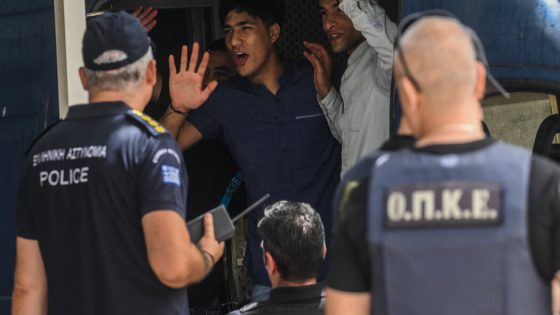Nearly a year after one of the deadliest shipwrecks in the Mediterranean Sea, off southern Greece, a court in Kalamata dropped criminal charges on Tuesday against nine Egyptians charged in connection with the tragedy. The court deemed that Greece did not have the jurisdiction to try the case, as the trawler sank in international waters.
Lawyers for the defendants, who were on the trawler when it sank but were accused of smuggling and other crimes, hailed the decision as belated justice. But the court did not rule on whether the Egyptian men were guilty or not — only that the case was not for Greece to decide.
The outlook for the case is now unclear, including where else it may be tried. A separate investigation by the naval court into the shipwreck and the actions of the Greek coast guard is continuing; the effect of Tuesday’s ruling on that inquiry is also undetermined.
More than 700 people are believed to have been on the rusty fishing trawler Adriana when it sank on June 14 off the southern coast of Greece, en route to Italy from Libya. Only 104 people survived — all men and boys, most of whom were from Syria, Egypt and Pakistan. Survivors’ testimonies said that women and children were onboard, too, but on lower decks and unable to escape.
Eighty-two bodies were recovered; the rest of the passengers were never found, as the vessel sank in one of the deepest parts of the Mediterranean, making recovery efforts essentially impossible.
Of the survivors, nine Egyptian men were detained in June on charges of migrant smuggling, membership of a criminal organization and causing a deadly shipwreck. They would have faced multiple life terms in prison if convicted.
The men’s lawyers argued that they were simply passengers of the Adriana and were being unfairly prosecuted in an attempt to punish asylum seekers for smuggling rackets. They also claimed that Greece had no jurisdiction in the case because the shipwreck had occurred in international waters, an objection that the court upheld on Tuesday.
One of the defense lawyers, Alexandros Georgoulis, said the decision set a “strong legal precedent” for Greece’s role, or lack thereof, in cases involving migrant shipwrecks. “The court recognized that Greece can’t continue to play the part of international police officer,” he said.
Although the court made no judgment on the men’s role in the shipwreck, Mr. Georgoulis called the ruling a vindication for them. “It’s justice, albeit belated, for these people who, in the space of a day, went from shipwreck victims to defendants on serious criminal charges that carry multiple life terms,” he said.
But prosecutors argued from the outset that the nine defendants were part of the crew and were responsible for acutely overcrowding the vessel and mistreating the passengers.
Although the Adriana was in international waters when it sank, 47 nautical miles off the Greek coast, the location remained within Greece’s zone of responsibility for search and rescue. But the Greek coast guard monitored the vessel for hours without intervening. The authorities said this was because the vessel’s crew consistently refused help, insisting that it wanted to continue to Italy.
Some maritime law experts have said that the Greek coast guard should have intervened regardless. “The international law of the sea is clear in providing that assistance shall be rendered when life is in danger at sea, regardless of whether or not it has been refused,” Aphrodite Papachristodoulou, a visiting researcher at Harvard Law School and postdoctoral fellow at the Irish Center for Human Rights, said in an email on Tuesday. “Coastal States have authority over their search-and-rescue zone (and this extends over both territorial and international waters) and hold an obligation of due diligence to provide adequate and effective search and rescue services in their search and rescue region,” she added.
In their initial testimonies, some survivors said that the Greek coast guard had caused the Adriana to capsize after trying to tow it, accusations that the Greek side rejects.
Rights organizations have expressed concerns about the independence of investigations by the Greek authorities into the sinking, and Tuesday’s ruling about jurisdiction stoked worries about the possible outcome of the naval court’s inquiry. Judith Sunderland, the associate director for Europe and Central Asia at Human Rights Watch, said on social media, “The Naval Court DOES have jurisdiction over the Greek Coast Guard no matter where it’s operating.”
Earlier on Tuesday, a small group of protesters criticizing European migration policies and what they referred to as a “state cover-up” clashed with riot police officers outside the courthouse in Kalamata, leaving two protesters injured.
It remained unclear when and where a new trial might be held. A prosecutor told the court on Tuesday that when a ship is in the open sea, the only government that has jurisdiction over any crimes is the one associated with the ship’s flag (with some exceptions, like piracy). The Adriana did not have a flag.
Source Agencies



